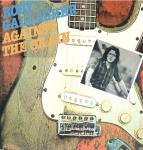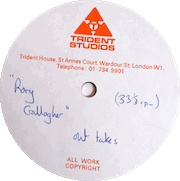May 16 2011
Rory Days: An interview with Robin Sylvester — Part 4
Robin Sylvester, bass player for Bob Weir’s RatDog, has been a fixture of the San Francisco music scene for so many years that one might understandably forget his substantial musical accomplishments in his own native England. In the late sixties, as the British Blues explosion rocked the pubs, clubs and concert halls of London Town, Robin was one of those lucky sods who witnessed it all, and much like his American counterparts who descended upon Yasgur’s farm in the summer of ’69, he can legitimately point to those heady times and say, “Yes, I was there!”
Born in 1950 Post War London, Robin spent much of his youth singing with the London Boy Singers, a professional boys’ choir patronized by distinguished composer Benjamin Britten. The choir performed regularly at Covent Gardens, and even made an album of Christmas music at famed Abbey Road Studios. Although now primarily known as a bass player, Robin also plays keyboard and guitar. By the time he turned 15 he was playing double bass in a Jazz band called, the David Lund Trio, and then later, the folk-rock band ORA. In 1969 he started working as chief engineer at London’s Tangerine Studios, and for the next 5 years worked closely with some of the finest up and coming Jazz, Progressive Rock, and Blues bands of Great Britain — none finer, at least in this writer’s view, than Ireland’s favorite son, Rory Gallagher.
Recently, I had a chance to ask Robin about those heady times in London where he witnessed first hand the great British Blues & Rock explosion — attending incredible shows at famed nightspots like the London Marquee, and recording aspiring musicians at Tangerine Studios. In Part Four of the interview, Robin talks about working on Rory Gallagher’s first album with Chrysalis Records, Against the Grain. You can read the previous parts of the interview here: Part 1 | Part 2 | Part 3
Part Four: Against the Grain
Shadowplays: You mentioned in an old interview that Rory considered offering you the keyboard position in the band. Was this when they were a 3-piece with Wilgar on drums? Prior to Lou being hired? And let me just say, what a great “if only” that one is!
Robin Sylvester: I don’t think he considered me very seriously! His exact words were: “You’ll never know how close you came to being offered the gig!!” with a big smile on his face! (After he had hired Lou.) We did have some fun jams though, especially on breaks during long re-mix sessions. I knew all his material . . . .!! And yes, sometimes I played THAT guitar.
Shadowplays: With the completion of Irish Tour ’74 Rory had finished up his obligations with Polydor and signed a multi-album deal with Chris Wright and Terry Ellis of Chrysalis. You are credited as engineer and remixing on the first of these albums, “Against the Grain”.
The album had some good rockers like Souped-up Ford, Bought and Sold, and I Take What I Want. There is almost a 2-year span between IT’74 and Against the Grain, Rory came into the studio with a lot of new material. In an interview, Rory mentioned that it took longer than previous albums to record, taking more than a month. How long had it taken to record Deuce or Tattoo? Could you see a difference in Rory’s approach to this album as opposed to Tattoo or Deuce?
Robin Sylvester: I don’t recall things taking a lot longer, at least as far as the playing was concerned. He was still polishing some of the lyrics, so I suppose there were a few more vocal overdubs than before. I had some American visitors, and he ran a draft of Souped-Up Ford by them to make sure the terminology was right!
We did some good mixes and made a test-pressing before it was decided that the piano needed to be louder. I can take partial blame for this, as I was not over-fond of the RMI piano Lou favoured. Since I felt like it always cut through anyway, I did tend to bury it slightly. This also left more room for Rory. Anyhow, we went back to Wessex and ran the mixes in sync with the 16-track, boosting the piano to taste, therefore ending up with a generation loss. It worked ok; but I still have the first white label test-pressing, and the first mixes really do have more depth and presence.
Shadowplays: Generation lost? Do you mean the loss of some sound quality because of recording a recording, something like that? By this time was Rory more amenable to breaking down the song and recording his voice and guitar piecemeal?

Robin Sylvester: Just so: the final mix was a recording of a recording with boosted piano added. There was no synchro between the 2-track (mixes) and 16-track (with the piano track), and we had to keep it in time with tiny adjustments of the 16-track speed. The only alternative was to re-mix the whole record, which I assume someone must have done by this time. Rory was always amenable to overdubs and fixes where necessary; he just preferred to get it down in an organic way.
Shadowplays: Speaking of re-mixes, something we haven’t talked about yet is the CD re-issues of the albums that you were involved with that have been released over the years. When they came out, there was considerable discussion among his fans regarding these remixes compared to the original albums. What are your thoughts about these re-issues?
Robin Sylvester: Being an old vinyl-fan, I haven’t listened a whole lot to the cd’s. I know nothing of the re-issue history, and I’ve never made a real comparison — until now. So I took the time to listen to all my Rory recordings that I could gather. These are mostly old vinyl, with some cd re-issues and a couple of live cassettes, – plus my treasured test-pressing of the SF album & test-lacquer of the 2 rejects from ATG. It was as overwhelming as it was enjoyable; most enlightening, and slightly frustrating . . .In general, I am not a fan of cd re-issues, especially when they are new mixes. The extra reverb on the Beatles, Aretha without the sizzle, the smoothness of Zappa’s painstaking reconstructions, – they all annoy me! So when I hear, say, Rory’s vocal with a ton of delay on it, I remember how he always made me pull such effects back more and more until they were just a slight fattening texture, – and that naturally gives me a bias towards the original mix with all its imperfections!!
Shadowplays: Well for example, how different was the remix of “Crest of a Wave,” the final song off the album Deuce? I’ve said it before but… what a great way to end an album!
Robin Sylvester: Crest OF A Wave is probably my favorite tune. I was a little concerned about the rhythm guitar sound on the new mix. What sounds a lot like a chorus effect (about 5-years too early!) is, I think, 2 guitar tracks playing together. Rory may have re-done his guitar part, but I’m sure it was not intended to be a double. Ironically, I sometimes used to play tracks back this way hoping to get his interest! – but he always had me roll back the double until it was invisible. It IS an appealing (and modern) sound, to be sure; I’m just used to the bite of the original. As I recall, that incredible slide solo and most of the vocal were performed live with the band. Flawless! – as the thrilled 19-year old engineer says at the end!
Notwithstanding my bias, it is not my intention to criticize the magnificent restoration jobs that have been done; tweaking those old 8-tracks must have been tricky. The acoustic tunes have been polished up particularly nicely.
Shadowplays: Colin Fairley, ex-drummer for String Driven Thing, did the re-mix of Deuce in 1997, a couple of years after Rory’s death. In an interview for a technical mag, Colin talked about spending most of ’97 remixing and remastering three of Rory’s albums, searching through hundreds of old multi-tracks for unreleased “gems.” Now that would be a nice way to spend a year! How does the remix of “Against the Grain” compare with the original? I think Rory was involved with the first CD reissue in ’91 and then Tony Arnold did a remix in ’99.
Robin Sylvester: I listened to my reject master [of Against The Grain lp] – the first mixes! – and was amazed. There is the sparkle on the drums, the fatness of the guitar, as originally intended! Sure, the piano is buried every now and then, but Rory sounds great! An old fogey like me can clearly hear the total lack of digital anything in the whole process. I can hear a few punch-ins that would be considered sloppy today! – but it was all on the fly: I was making instant decisions what to keep and where to punch. Yikes! Sounds scary now. But we all communicated well, and I really do think I knew what Rory wanted by 1975. My “Souped Up Ford”, especially, could definitely use more piano; it’s a pretty funky mix, – but the slide guitar could make paint blister! so I was probably sidetracked. The decade-old cd version buries the piano too, except for the solo. Good solution. We kept the organ more in the background on purpose.
Some of the lead guitar “comps” (chosen blends of performances) sound a little different from mine. Good idea, going back to the original tracks if they still existed. Digital can be your friend . . . . I noticed this on “I Take What I Want” where there is a little fumble which I would have tried to disguise somehow. Then I realized there was probably no indication on the original tape box beyond “favorite” or some such vagueness! I took notes on such things, my own shorthand, – I probably just tossed them out after comping. I saw some such notes I made in SF for “Overnight Bag” somewhere in my garage . . . .
Shadowplays: You mentioned a test-lacquer of 2 rejected songs from ATG. My Baby, Sure & Cluney Blues were the bonus tracks for the CD re-issue of Against the Grain. Were these the tracks that were left off the original vinyl release?
Robin Sylvester:

My Trident reference lacquer reveals the 2 tracks that we finished and left off ATG for reasons of space, mostly. Rory may have been unsure about how the rockabilly flavor of “My Baby Sure” would fit in with the other tunes. 1975 was a bit of a fluffy year in music, and he definitely wanted to make a rock album. The second tune is “Lonesome Highway”, and has always sounded good to me. The cd mix (on the Best Of) sounds almost exactly like mine actually.
“Cluney Blues” was presumably a test, – I told them to play something, adjusted levels and started the tape at some point for the guys to take a listen. You can hear me adjusting (trying to rein in!) the guitar as Rory gets more dialed in himself. I’ve not heard this since the day it was played! Rory lived in Cluny (sic) Mews in West London.
“My Baby Sure”: I’ve been enjoying this in private for 40 years. I’ve borrowed the bass-line myself on occasion – thanks Gerry! My mix is a tad more rockabilly flavor, and the guitar is way “echoey”. Love the chat at the beginning of the cd version! I was always trying to catch that stuff, and sometimes would save it secretly on another track (so it wouldn’t play back every time). Rory always nixed using such things, but they made him laugh all the same. “Bought and Sold”‘s ending (“Last orders please” plus applause) I don’t recall at all. I might even be clapping! (Here and elsewhere on the album!)
It’s entirely possible that the frequency response on my test-pressing is superior to that on a 40-year old tape! Too bad I don’t have pro noise-reduction software to remove the surface noise and random crap! Comparing directly, the new mixes are beautifully even sonically, especially in the low end (bass). This was of course a well-known tricky area of vinyl mastering, not to mention mid-70’s monitoring systems, and I’d rather not go into it now. So it’s all personal preference, of course.
Shadowplays: Against the Grain was recorded at Wessex Studios in London, England. Were you still home-based in England or had you already moved to the States? I recall reading that you had spent some time in New York playing bass for Dana Gillespie, and then with The Movies? Were you puddle-hopping between Wessex Studios in London and your commitments in New York?
Robin Sylvester: Again . . such detailed knowledge! I was back in London after Dana’s tours at the time, waiting to hear from The Movies. When that call came I moved to New York.
Shadowplays: Against the Grain is the last album of Rory’s that credits you as engineer, yet this is not the last time you got the chance to work with Rory. Let’s talk about your final work with Rory, something I was unaware of until just recently when I had the good fortune of talking with Elliot Mazer. Let’s talk about the ill-fated sessions in San Francisco!
End of Part Four
This ends Part Four of my interview with Robin Sylvester. In Part Five, the final episode, Robin talks about working with Rory on the ill-fated San Francisco sessions, and some final remarks about Rory’s legacy.
6 Responses to “Rory Days: An interview with Robin Sylvester — Part 4”

Great series of interview! I love it…well done, Milo!
thanks a million for this, imformative and entertaining cheers jed
how many sales does a “silver” represent?von lmp
how many sales does a sliver record signify?
Milo this series of interviews is a real joy and is full of treasure. Hats off to you!
Thanks Milo! My english is poor and sometimes I have difficult in understand, but the interview is rich and fine!
From Brazil!